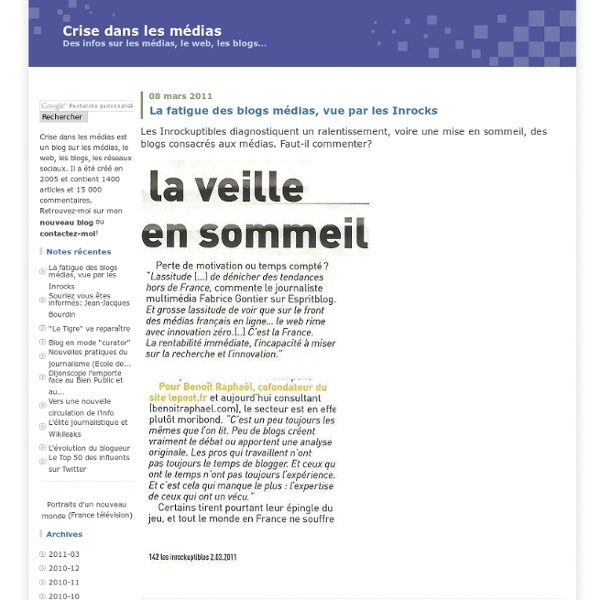



http://crisedanslesmedias.hautetfort.com/
vite dit et gratuit Et encore un "Brexit regretter" ! Quatre jours après les résultats du référendum britannique, les quelques lignes parues en page intérieure de The Sun et signées de l’éditorialiste Kelvin MacKenzie ne sont pas passées inaperçues. Après avoir harangué les lecteurs dans les colonnes du tabloïd sur les bienfaits du Brexit, MacKenzie ne semble plus si sûr. Le labo médias de l'école de journalisme de Sciences Po Crédit photo: Eric Antheaume Où étiez-vous le vendredi 13 novembre 2015? Jamais vous n’oublierez ce que vous faisiez ce soir-là, au moment où les attentats ont frappé Paris. Vous n’oublierez pas non plus comment vous avez appris l’existence des fusillades dans les 10 et 11e arrondissements parisiens, puis l’explosion des bombes au Stade de France. Les journalistes, français, étrangers, sur le pied de grue ce soir-là, n’ont pas oublié non plus.
LES PENSEES DE MANU L'état en appelle à la soumission sociale en Guadeloupe - Peuple Le préfet de Guadeloupe, Nicolas Desforges, appelle solennellement à la fin de la grève en Guadeloupe dès ce lundi 2 mars. C'est un récidiviste des appels solennels puisqu'il en appelait déjà le 13 février dernier, grâce à une lettre solennelle ce coup-ci, à la réouverture des stations services. Nicolas Desforges se plaignait donc, le 13 février, de ne pas pouvoir continuer durablement sous le régime de réquisition des stations services. Il se considérait également, à ce moment là, comme médiateur du conflit. Préfet et médiateur: le conflit d'intérêt entre ces deux fonctions n'aurait pas pu être accepté en métropole. Mais il semble qu'aux Antilles tout soit possible; les poncifs et les préjugés ont donc de beaux jours devant eux, même sous la plume de Christophe Barbier dixit Harry Roselmack.
Journalistiques Cratyle.net Le "Washington Post" met un pied dans l'agrégation de contenus Le Washington Post abdique ! Las de faire hierarchiser l'information par ses journalistes, le vénérable journal s'en remet à un algorithme. Enfin, pas tout à fait : le quotidien américain vient d'acquérir la société iCurrent, un outil qui permet d'agréger des informations en ligne provenant de sites de confiance en fonction des centres d'intérêts du lecteur. Selon le site Venturebeat, l'opération s'élèverait à plus de 5 millions de dollars. Le Washington Post n'a pas précisé son projet pour cette première acquisition dans l'information automatisée mais indique avoir racheté iCurrent pour sa technologie autant que son équipe. Signe particulier, iCurrent ne repose pas sur un seul algorithme mais intègre aussi la validation humaine.
Médias Les gouvernements sont tombés amoureux du datamining car ça fonctionne vraiment très bien. C’est efficace. C’est efficace pour les bonnes causes autant que pour les mauvaises causes. Journalisme: Photo d’une profession malade Une profession vieillissante, où les femmes ont du mal à se tailler une place… Un métier mal rémunéré où les salaires baissent… Les journalistes français paient cash la crise de la presse. Il n’est pas étonnant, dans ces conditions, que leur nombre stagne. Autant dire que la lecture de l’étude Photographie de la profession des journalistes, réalisée par l’Observatoire des métiers de la presse en coopération avec la Commission de la Carte d’Identité des Journalistes (CCIJP), est déprimante. On trouvera tous les détails de cette étude sur le site de l’Observatoire des métiers de la presse (.pdf), sachant que la précédente enquête datait de dix ans. Elle avait été réalisée en 1999, sous la direction de Rémy Rieffel, par l’IFP. Le moins que l’on puisse dire est qu’à dix ans de distance, la situation des journalistes —toutes catégories confondues— s’est nettement dégradée.
Elevage en batterie des petits enfants : non merci : Le blog de Sami Kanaan Arrogance et incompétence Alors que la qualité de l’accueil dans les institutions genevoises de la petite enfance est largement reconnue, alors que toutes les études confirment à quel point l’investissement de moyens importants pour ce domaine de l’action publique amène des bénéfices majeurs non seulement pour les enfants et familles concernés, mais pour la société en général, alors que la demande pour placer des enfants en crèche ne fait qu’augmenter, la droite dure du parlement a décidé de péjorer massivement les conditions d’accueil pour les enfants entre 2 et 4 ans. Cette alliance malsaine entre UDC, MCG et PLR, qui semble devenir pérenne, représente une triste combinaison d’arrogance et d’incompétence.